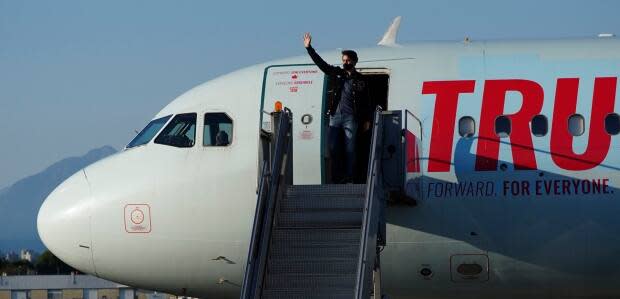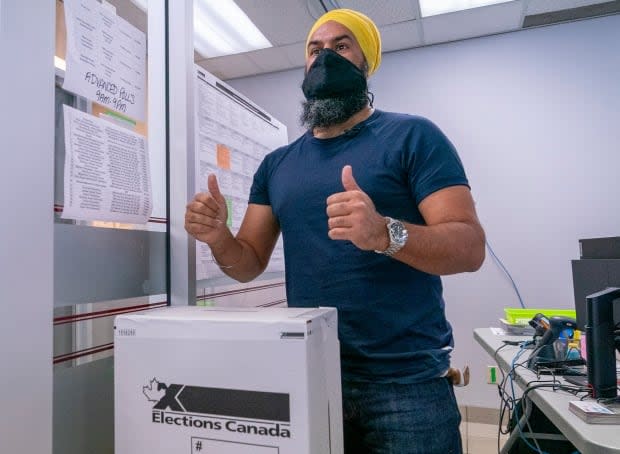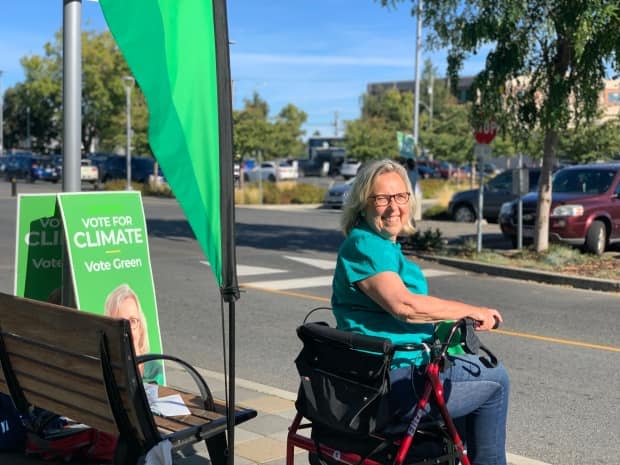What British Columbians need to know about the federal election

The federal election is on Monday, Sept. 20, 2021. If you live in British Columbia, here's what you need to know as you head to the polls.
Why is there a federal election happening right now?
This is the second time British Columbians are heading to the polls during the pandemic — after a provincial election on Oct. 24, 2020 — and a lot of people aren't too happy about it. According to a Nanos poll, three out of four Canadians don't believe a federal election should be happening in the middle of the fourth wave.
Gerald Baier, a political science professor at the University of British Columbia, says there's a mix of apathy and anger.
"My sense is maybe more indifference than dislike, although we're seeing some really strong reactions to the prime minister in public. You know, security concerns at rallies, we've seen all candidates' meetings being shut down in this province," said Baier.

Trudeau's Liberals — which formed a minority government in 2019 — are hoping to duplicate what B.C. Premier John Horgan was able to do in his 2020 election that swept the B.C. NDP into a strong majority.
"Governments in power prefer majority governments, and that's really what the Liberals have been after," said Baier.
How many seats does British Columbia have?
B.C. holds 42 of the 338 seats in the House of Commons.
In the 2019 federal election, the Conservatives won 17 of those seats, and the Liberals and NDP each had 11. The Greens had two, and one seat was held by an Independent.
Overall, is there a chance for change?
In a short answer, yes, says Kimberly Speers, a public administration teaching professor at the University of Victoria.
"It's an election where I've never seen so many undecided voters, even at this point. … People will be staying up late in Ontario and watching what happens in B.C.," said Speers.

Baier says the NDP — whose leader Jagmeet Singh is running in the Burnaby South riding — could prove to be a wild card.
"The Liberals are holding steady at that 2019 number. … The Conservatives have dropped a little bit. But the seat projections might still be about the same for them. The only real big difference is the NDP surging in the province."
What are some races to watch in B.C.?
There are a couple of tight races in British Columbia.
One of the closest races in the country during the 2019 federal election was in Port Moody-Coquitlam. The Conservatives beat out the NDP by just 153 votes.
Then there's Vancouver-Granville. Jody Wilson-Raybould has held this seat since 2015. She had originally been a Justice Minister in Prime Minister Justin Trudeau's cabinet but she was booted from the party after the SNC-Lavalin affair. She won her seat in 2019, but as an Independent.

She's not running in this election, and the Liberals' hopes of reclaiming the riding have hit some snags after their candidate, Taleeb Noormohamed, was found to have flipped multiple houses in recent years — undermining the party's pledge to introduce a house flipping tax.

On Vancouver Island, the Greens are hoping to maintain their two out of three seats in Parliament. Former party leader Elizabeth May is expected to win the Saanich-Gulf Islands riding again, but Paul Manly's riding of Nanaimo-Ladysmith has become a battleground.
"The Conservatives and NDP are really, really putting a lot of energy and money into that riding. They want that Green seat," said Speers.
What are the top issues in B.C.?
One key issue in British Columbia is the environment, especially during a summer that saw the third worst wildfire season on record, a record-smashing heat dome, and continued protests against logging old growth forest at Fairy Creek.
"I think a lot of people are still thinking, well how come we haven't met our targets and how come we're still behind other G7 countries in terms of our reductions? I think that is the issue for the Liberals," says Sanjay Jeram, a senior lecturer of Political Science at Simon Fraser University.

Housing affordability is another big issue. Each party is making its own pitch: the NDP is emphasizing renters and social housing, while the Conservatives and Liberals are catering to homeowners and those wanting to enter the market.
"It's difficult to say that one party has come out on top in that particular debate in B.C. It's about certain demographics being targeted by each of the parties," said Jeram.
How can you vote?
There are three ways to vote.
1) Advanced polls were open between Sept. 10 and 13. Elections Canada also allowed voting at its offices up until Sept. 14.
2) You can vote by mail-in ballot. If you'd like to vote by mail but haven't requested your ballot yet, you can apply online at this web site. (The deadline to request a mail-in ballot is Tuesday, Sept. 14 at 6 p.m.)
3) On voting day on Monday, Sept. 20. Double check your voting card to see your assigned location and bring an ID. If you don't have any ID, you can still vote as long as you have someone to vouch for you, who can provide their identity and address.
When will we find out the results?
It might take longer than usual, says Speers, because of the mail-in ballots.
"Depending on how close the race is as well, you know, we might not be able to call a winner on election night. We might have to wait a few days until all of the mail-in ballots are counted."

